(photos are mine unless otherwise noted)
The Pudding Shop is a nickname for the Lale Restaurant in Fatih Province, Istanbul, Turkey. During the 1960s, the Pudding Shop served as a meeting point, pit stop, and information hot-spot for beatniks, hippies, and other Western travelers en route overland toward the far east. They were usually following a route that came to be known as the Hippie Trail, most commonly traveling with an Indian destination in mind. More often than this, they were wandering aimlessly, living only for today and the next Bob Dylan album. Corners were cut to keep these trips cheap: hitchhiking, trains, buses, and a general acceptance of shabbiness in place of ordinary travel comforts were the necessary precursors to be embraced to lengthen their journeys. Well, why East?

It's complex. Just as explaining that a tree grows from "the sun" is a terrible simplification, attempting to enumerate the sociological development of any culture is to necessarily forgo details in spite of their potential importance. I only aim to leave an impression.

It was the 1960s in America, a troubled time marked by political anxiety due to the Vietnam War and Cuban Missile Crisis, exposure of the government's corruption, and an increasingly large ideological gap between generations. This was the pre-condition leading to widespread anomie: a sociological term referring to the erosion of beliefs, values, and thought-systems, inevitably leading to existentialism, feelings of futility, and depression. As this era's Americans' foundation began to crumble, panicked architects attempted to erect something new in its place. As such, widespread experimentation of implementation and content of all sorts took place in this time in the form of spirituality, sexuality, psychoactive drugs, fashion, diet, politics, literature, and philosophy, to name but a few. Many of these experiments were spearheaded by minorities in the country: homosexuals, women, and especially the racial sub-groups; African-Americans, Mexican-Americans, Indian-Americans, Native Americans and more. Thus, the experiments were colored by their values. For example, female-focused sexuality gained in popularity as a "women's pleasure" movement snowballed across the culture. Additionally, polyamorous "free-love" marked by the ethical motivation of non-possession gained traction, a value formed by the Eastern values rising in parallel. Fashion from Africa and the Middle-East grew in popularity, as it became fashionable to wear one's "natural hair", especially not straightening it if you had curly hair, and for men to grow their hair long and not wear hats. In fact, shaving body hair was rejected as a personal revolution in name of the conformity of nature. Women's blue jeans grew in popularity. Other times, in search of new ingredients for cultural recipes, Americans would search East. Veganism grew in popularity as ecological consciousness did, largely informed by Hinduism. Cults appeared as symptoms of spiritual loss, as did great advancements in music, producing The Beatles, Jimi Hendrix, Janis Joplin, and Jim Morrison of The Doors. The Doors were named after Aldous Huxley's essay "The Doors of Perception", a short memoir where he explains his experience doing LSD, an influential, actionable text that contributed to the theme of drug experimentation in this time. Aldous Huxley is an Englishman, but the cultural experimentation happening largely in America's New York and San Francisco incited parallel movements in Western Europe, specifically in large cities like Paris, London, or Milan.
New branches of culture naturally rotted away as failures, certain limbs continue to contemporarily bear fruit, and some were so "successful" - especially drug experimentation and political action - that they frightened the government. They were carved and amputated into acceptable forms through aggressive legislation and clandestine operations. So again, why East? Perhaps we shall say a subset of meaning-hungry American counter-culturists felt urged toward the other hemisphere in search of new values in a culturally desperate time.
Suppression of this era's hippie and beatnik counter-culture in the United States is heavily political and intentional, a great shame as their collectivization forms some of the sparse, honest cultural development in America. This reality is not to say that they're immune to critique: they're certainly not. Just like today, Western travelers often have a negative reputation due to their carelessness, cultural imperialism, and arrogance. Especially in the 60s during the heyday of the Hippie Trail, Eastern locals were wary of Western Travelers' gluttonous attraction to their wild opium and cannabis plants. In the cultures of many of the Eastern countries along the trail, these drugs are infused with a religious or spiritual element, something especially attractive to this cold generation quickly becoming politically and spiritually conscious. Now, there's a great difference between indigenous cultures enjoying time-honored rituals and Western travelers seeing a new shiny excuse to get fucked up. The dissection of anyone's spiritual ventures, especially of historical characters, is a touchy, impossible subject, so I shall go no further. However, I feel comfortable saying at least some of these travelers came East with wholesome intentions, but I fear that many did not.
America is an incredibly young country with a slim pre-industrial history and citizens who will openly reveal their desire for a cultural depth that simply doesn't exist. Hence, the common Indian destination. India is a nation with perhaps the oldest religious history. It's an etymological, semantic and anthropological difficulty to pinpoint an exact source of religion, however, by all means the history of religion in India is very old. India was (and is) additionally attractive to Americans due to the country's history of British colonialism. Many of the inhabitants speak fluent English.
Enough background. I began my journey eastward with a flight to Istanbul. This trip was to serve as a spiritual repetition and journalistic pursuit of the old counter-culturists’ in our present cultural stagnation. I was additionally interested in visiting, observing, and comparing countries where Christianity is not the predomination, and with history of other social or economic systems (perhaps nomadic, communistic, caste, or feudalistic), all differences to my America.
Hollywood is not generally interested in casting Kazakh actors or telling Nepalese tales, and certain groups have only a tiny diaspora in the United States, especially in the Western parts where I'm from, so I was delighted to see that there are simply different skulls, eyeballs, eyebrows, mouths, ears, and eyes I'd never imagined. To acknowledge new beauty is a rather silly thing, but it’s certainly a welcome sight to behold in something as commonplace as a face. I saw a lot more open-toed shoes and long tops. I saw unabashedly barefoot adults lying contorted over immovable armrests in exhausted discomfort. I saw a water dispenser offering only hot water. I was horribly hungry so I took a terribly overpriced croissant from a vending machine and sat down near a charging station to charge my phone. I wasn't as cheap as the old Americans, but I had a terribly timed flight where I landed in Istanbul around 4am, meaning a few sleepy hours before any buses would depart from the airport.
Immediately as I started charging my phone and meditating, a Swiss-British man began talking to me - rather, at me, he wouldn't let me get a word in. This experience is incredibly common for me, a stranger somehow sees in my eyes my potential for psychotherapy and their need for free-association and metaphorically lays themselves upon the couch to start rambling. And I let them go on. So long as I can safely get away, I'm interested in what they say. He relayed his many inappropriate sexual stories, his history being a prostitute around Europe in the 1980s, later being a banker (pausing and making eye-contact with me, anticipating my surprise at his career change, before continuing disappointed and charged with resolve at my indifference), his dreams, plans really, of building a BDSM hotel in Spain (for "the heteros... queens always want things for free... queens, you know, the gays" - his words, not mine, and yes, I did know), of how he saw a cashier in the airport reading Mein Kampf, how when he attacked the book she defended it and held it close to her chest, how he really advised I stay away from stimulant drugs and sugar, how he lectured at the University of London in the history department, and when I questioned him about what history he said only "1500 to 1800"... (I believe his incessant and lying is a direct result of his stimulant abuse). I suggested that perhaps Mein Kampf ought to remain in print as a historical artifact, that freedom of speech should be non-discriminatory. To this, he said, "You're mixed race, Hitler would've killed you," and accused me of being a masochist. He asked me when I lost my virginity and I answered him. "Late... for me, I was 11."
Righty. I didn't nap in the airport but I didn't mind. I can't take these odd interactions that only take place in airports under sleep deprivation for granted: they're rare and invaluably human. Although, I hope he doesn't come to Spain. London fits him well.
After a few hours passed, I left the rambling man and boarded a bus that'd lead me near the Pudding Shop. Again, I saw sleepy adults contorting themselves to get comfortable, but this time their necks were bent terribly downward toward TikToks, Instagram Reels, or whatever the Facebook equivalent is. As I looked out the bus window, I became acutely aware that I was in a new country. A great Turkish flag swung in the air as the sun rose around me and we barreled toward the city center. Road signs were painted in new colors and symbols I couldn't decipher. Architecture suddenly changed, where the shape and quality of apartment buildings and frequency and vibrancy of advertisements fluctuated while crossing obvious economic boundaries. The bus dropped us off near a pier overflowing with boats, spilled trash, and tired dogs. There was another bus stop two minute's walk away. It was my first time outside in Turkey, and I hardly had time to breathe the air before boarding the next bus. It was hardly 5am yet it was fully sunny. This one was a sleepy, packed bus where many passengers were using their neighbor's arms as pillows. There was nowhere to sit down. I couldn't help but notice their comfort in casual intimacy: grown men showed no problem wrapping their arms around one another or sleeping on the other's shoulder. The short bus ride led to a sleepy touristic sector. I hadn't realized at the time, but the Pudding Shop was near the Hagia Sophia, likely the biggest tourist attraction in Turkey. So I had a random wander through alleyways of closed hotels, pretty cobblestones, fattening stray cats, beautiful flower arrangements, rug stores, and occasional confused, staring faces, before my sky was filled with this beautiful, intense mosque.
I stumbled upon the magnificent Hagia Sophia by accident without even knowing what it was. I was in awe, as anyone should be, but honestly, I was more curious about the white-dress and tuxedo-wearing bride and groom I saw sharing a 5:30 am hot dog on the nearby curb. I continued on through empty streets until I saw my destination in the distance. The Pudding Shop.
I took a few excited photographs of the building before heading inside, where I ordered the "continental breakfast" and a Turkish coffee from the quiet chef inside. The airport croissant did nothing for me, so I devoured my meal before taking any photos. My rules for ordering food in a foreign country follow the following priority: 1) order whatever I think I can decently pronounce 2) order whatever is most abstractly named, for the element of surprise, of course. It was a plate of boiled eggs, ham, cheese slices, olives, and tomato, all served with a side of delicious soft bread with cherry jam and honey. All the ingredients were simple but high quality, especially the bread. The table had a glass display with past and present currency underneath from many different countries. My friend recognized some Kyrgyz Som, the currency of our destination. On the wall, abiding tradition, there was a board of notes from various countries and in various languages, all with similar themes of carefree love with sprinklings of eastern religion. I left a note. There were menus in four languages: English, French, Spanish, and of course, Turkish. When I ordered in Spanish the worker understood me. The menu was distinctly in Spain-Spanish, as it represents the country with citizens rich enough for travel. I ordered rice pudding as a dessert. How could I go to The Pudding Shop and not get pudding? Again, it was delicious, unmatched. As I was about to leave a man stopped me to inquire in skeletal English where I was from. I obliged him - "America." "America? Yeah!!!" - and he shook my hand. He gestured widely at the restaurant's interior and said "The Internet! Ha!" with a half-snort-half-laugh that I still can't fully decipher.
Perhaps he meant that the Pudding Shop lived off mere images, just as I am, now. When I read about the restaurant, and made the decision to visit, I couldn't help but doubt that there was really once long-haired guitar-playing hippies laying outside on the grass, offering tips to other passersby and loading up liberated spirits into their freshly painted VW vans. Yet I don't mind admitting that I like to feel as though I am a part of this mythology. Perhaps making abstract appeals to an invisible, unquantifiable other is a common way a culture advances: such is the exact definition of a legend or myth. Certainly it's a tool used by politicians to advance their message. It's especially a favorite for those with fascistic tendencies: beware of allusion to the return of some unknown "golden age". Perhaps I'm reading too deeply, but I feel as though he was alluding to the inevitability of globalization in an internet-connected age. Tourists from everywhere come East enchanted while the locals are just serving food. We live in a rapidly homogenizing, privacy-killing, culturally bleeding time. It is our job to document it for future generations before it is lost forever. I followed a ghost here, so I am not disappointed that I found one. The hippie trail became closed to Western travelers after the Iranian revolution in 1979 and the soviet invasion of Afghanistan, so, since then, it has only lived in memories, I suppose up until about 2010. Upon the wall was a framed newspaper clipping, in English, about some old hippies' reunion in the Lale Restaurant
.There are very few American cultural products that I ever felt amounted to anything beyond costume. In my life, I never felt I met a hippie, only a decently convincing cosplayer. I never felt I met a punk, (well, perhaps a few), only a music-loving person with piercings and a notable haircut. This is not to say that everyone is a liar in America, simply that the crisis of identity is uniquely American. The main American cultural products that I acknowledge originate from the various diaspora living, maintaining, and inevitably distorting their cultures while existing in a new country. I believe a large source of this mass discomfort comes from our rapid rate of life. Be it the fast food, headlines, clickbait, or all sorts of dopamine-based media consumption. Culture, like wine, needs time to brew. And a young country with negligible pre-industrial history and with mass-genocide of ancient Native cultures can never have an opportunity to develop in this way, leading to large-scale crisis of identity, splintering symptomatic expressions, and odd solutions. I'm generalizing and pessimistic, but I hold it true.
I was searching for some postcards when I found myself in a small shop having a conversation with a Kurdish man. I wanted to buy a few, maybe 3, and he threw in a 4th one free. I asked him if he could make change with my cash. He agreed and invited me inside. He actually couldn't make the change, so I just gave him the equivalent of two extra dollars. With a mixture of English and Spanish, we spoke about his business, his Kurdish roots and subsequent tension with Turkey, his warnings of caution with locals here, his hopes with his children and his plans to send them to a Spanish school, his dislike of Islamic culture, specifically the treatment of women, and his general hopes for the future. He was incredibly warm and gifted me his self-published tourist's book about Istanbul. His name was Murat Arslan.
I continued on through random streets following only my feet as they fell before me. Like all big cities, there are markets that make use of every square inch of available space to advertise and display product. Occasionally my entire eye-sight became filled with charming vintage jewelry or lame Akatsuki shirts printed from bad JPEG files. Rampant consumerism. I'm not exempt: my favorite segment was this multi-storied store of books and paper ephemera that formed a continuous swimming pile. Of course, nearly all the books were printed in Turkish, but there were some English books to be excavated through careful digging. I found Saul Bellow's Humboldt's Gift, George Orwell's Burmese Days and Road to Wigan Pier (strangely enough, published by Turkish publishers, but in English), Shakespeare's The Merchant of Venice and Pericles, and McNeil's The Psychoses. My friend found Nietzche's Thus Spoke Zarathustra. There was an old European map printed in French and Spanish and a detailed map of the Southern United States that I wanted to purchase, but to my disappointment they only accepted cash and I hadn't any left. After all is done, I'm glad to have gotten the books, but what a fool I was. Could you have guessed that I would regret beginning a two week backpacking trip by purchasing several hefty novels? Hindsight, hindsight!
We foolishly waited until peak downtown traffic to begin our journey toward our second airport. We figured with several hours to go and a conservative Google Maps estimate, we were making great time, but after our bus was 10 minutes late and the supposed 5 minute bus ride melted into a sloppy 20, we lost hope we'd make it there on time by means of public transport. We hopped out of the bus to reconvene and take our chances flagging down a taxi, with hopes of making it to a train with the logic that train tracks don't have traffic jams. I'd have had better convincing a trout to swim toward me. The few taxis that passed always ignored us. Sometimes they were full of people. Buses would slowly roll by and we'd both half-heartedly question if we ought to hop on. Swarms of pedestrians holding plastic grocery bags full of Fanta bottles and vegetables were breathing heavily and chasing the ever-lapsing shade. Everyone was sweaty. 571, 890, 650, plastering LED bus numbers rolled through and the waiting crowd jostled forward to see if this was their ride. And when it was, it was always a somewhat violent event, always fighting one's way onto the bus, as if it could possibly speed off without you in the 5mph traffic. Finally, an empty taxi slowed down near us, but another woman had it first: "Sorry, guys," she said with surprising empathy. In an act of desperation I asked: "Are you going to the train station?" She replied, "Which train station? Where are you going?" "The airport," I replied. "The airport?! That airport?" She laughed aloud. "...you can have this one." She relayed the airport destination to the non-English-speaking taxi driver and quickly disappeared into the swarming clouds before I could even take note of her face. I wish I could have thanked her properly.
It took an hour and a half's drive for the city's traffic to relax enough for the taxi driver to go above 25 mph. As such, I was curious to see donut-vendors with rather sophisticated get-ups advertising their cold water bottles and snacks miles away from the freeway entrance. People sometimes casually walked through the freeway wearing opened toed shoes. I have no clue where they could have been going. At one point, a little girl walked up to the car to try and convince us (in incomprehensible Turkish) that we should buy her water bottle. She became frustrated and threw the bottle into the car with violence. My friend handed her the bottle back and the taxi driver rolled up the window without breaking eye-contact with the car ahead of him. I saw what was probably her older sister doing the same thing in the other lanes, and I saw her yell and throw a water bottle at a bus that had almost hit her.
The heat and exhaustion from the day overtook me as I was swept into a nap in the taxi, but I was jostled awake by intuition or an art-loving spirit who couldn't bear me to miss the scene. Sweaty, dehydrated, and plucking crusties out of my eyes, the taxi struggled its way across the bridge separating the continents as I yawned my way into Asia for the first time.



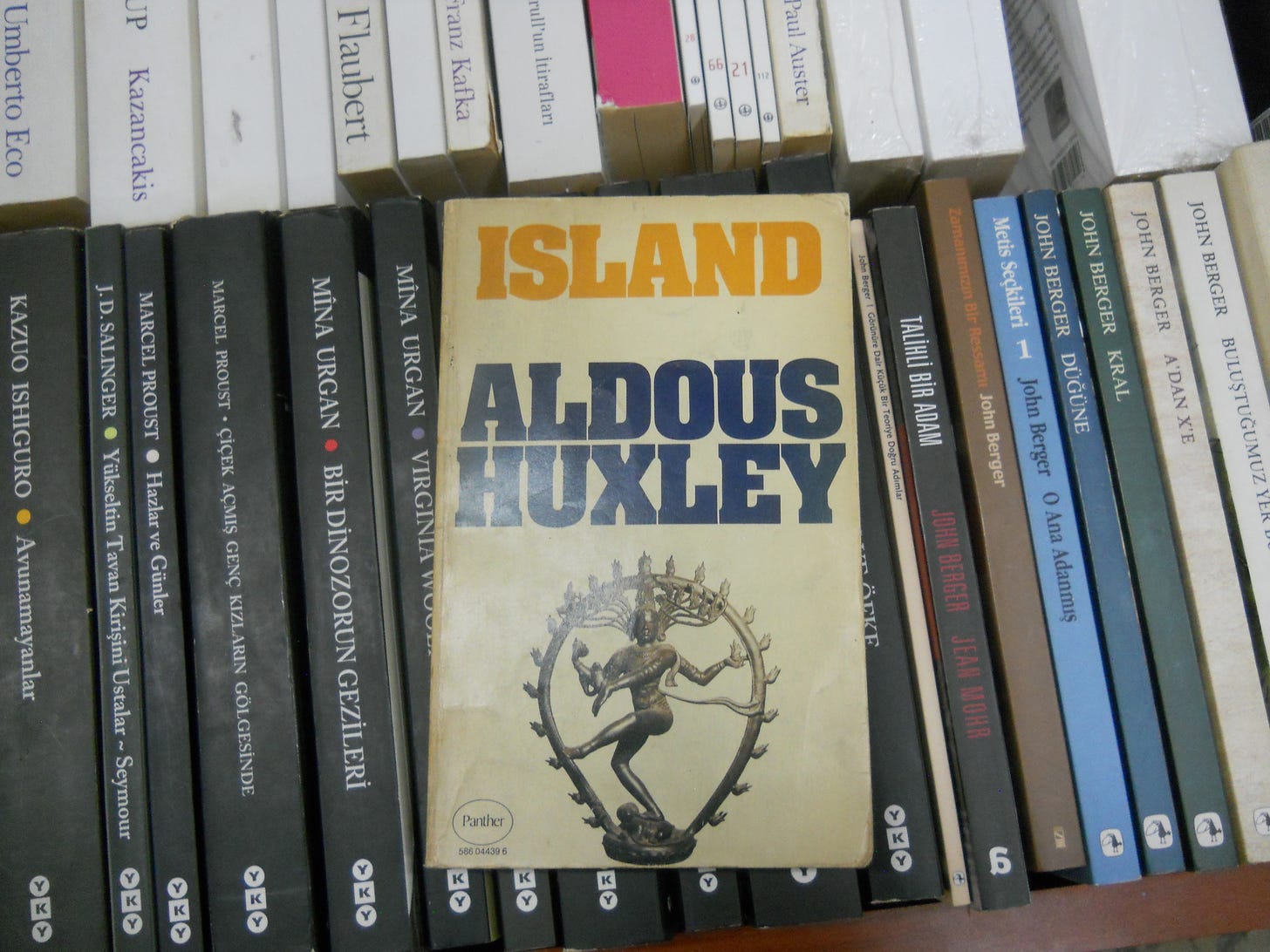
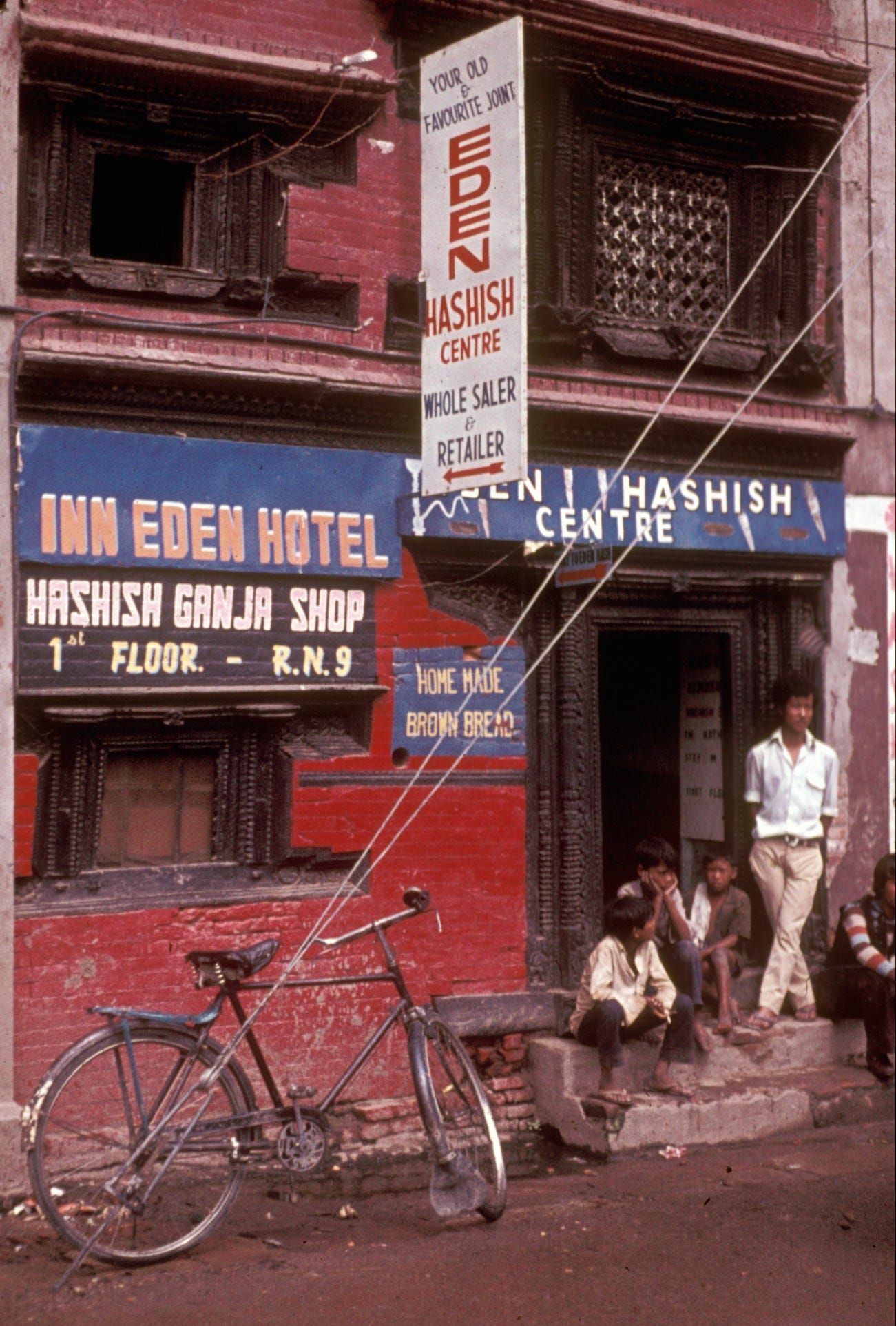
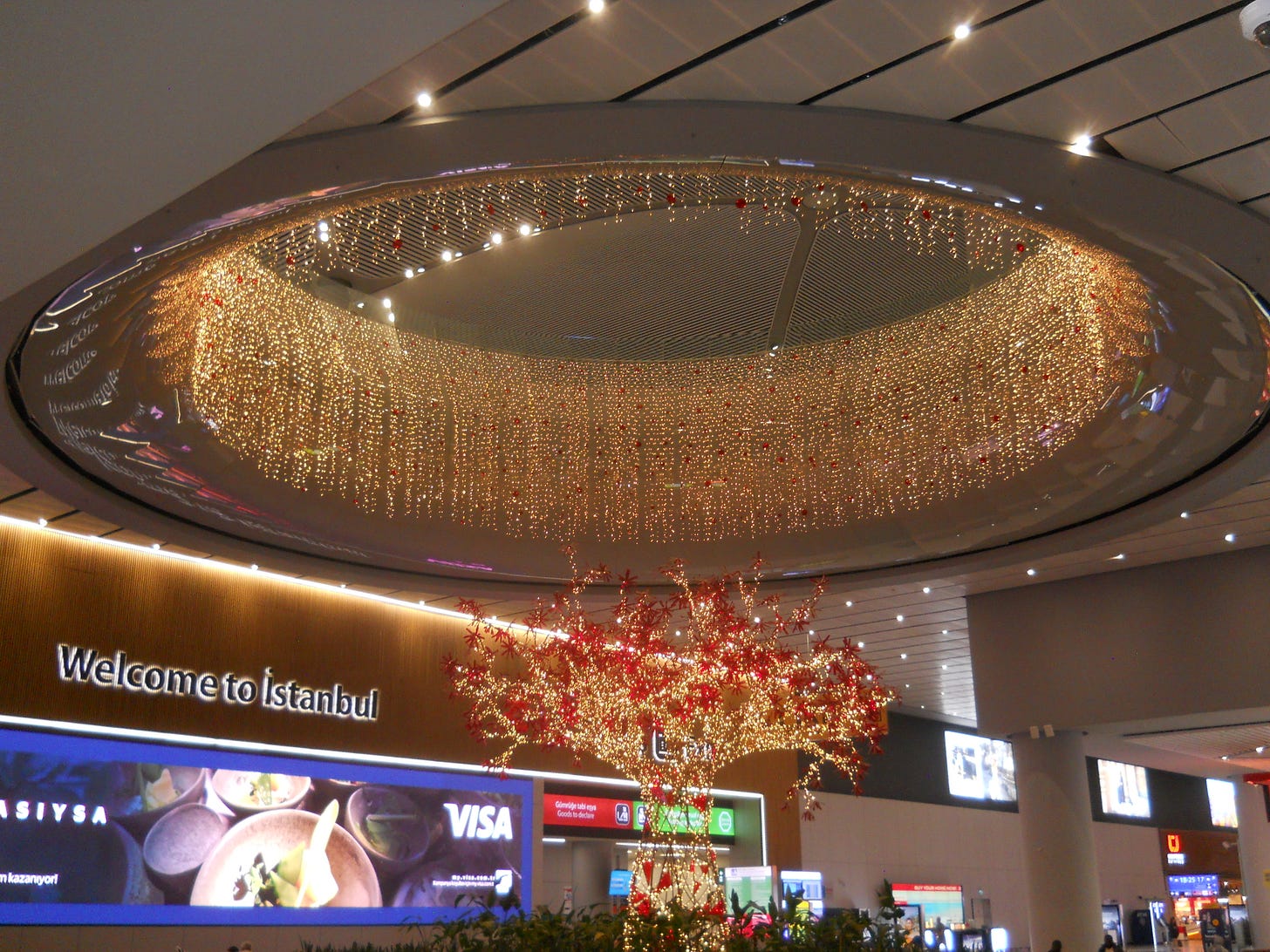
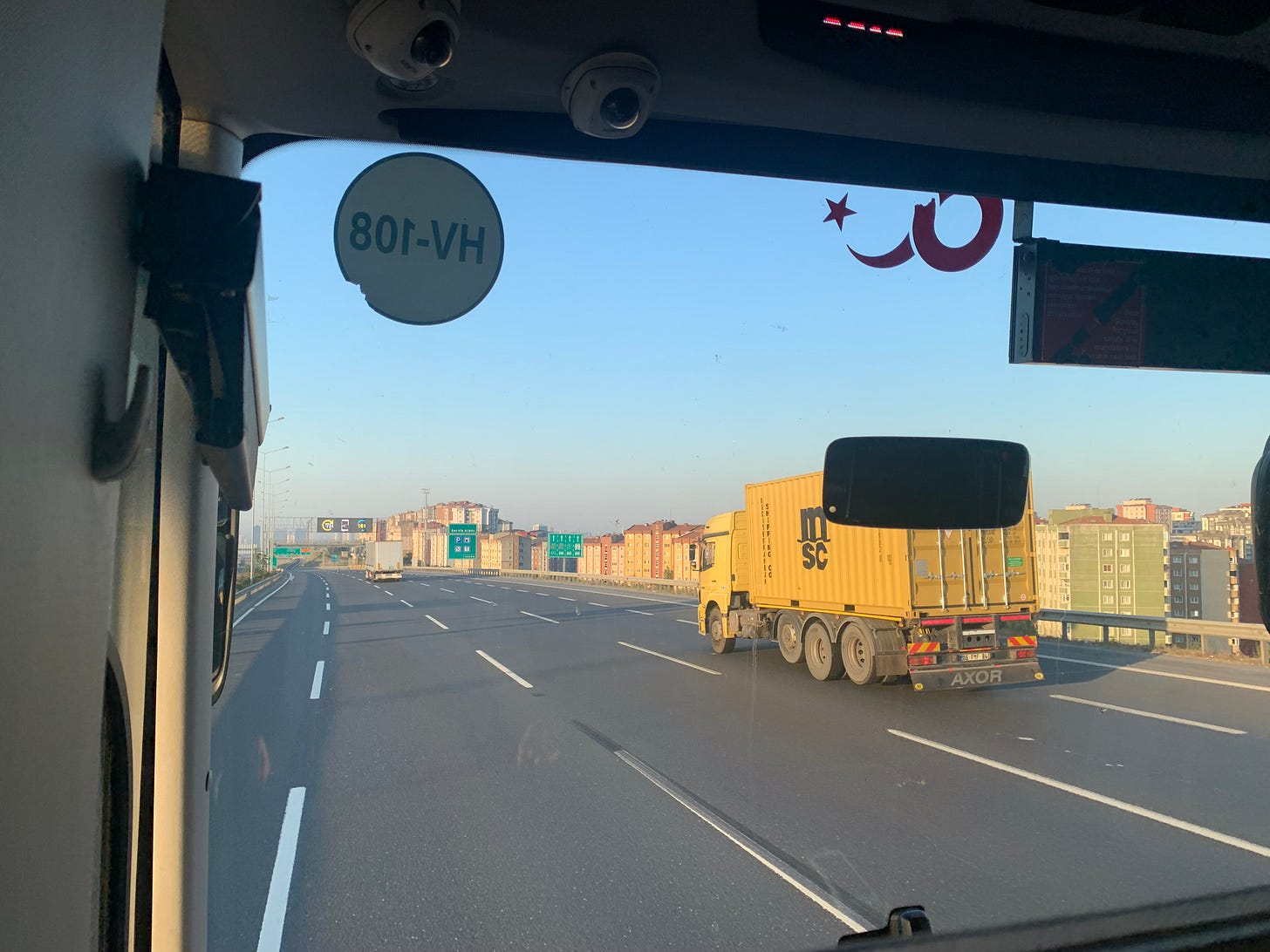
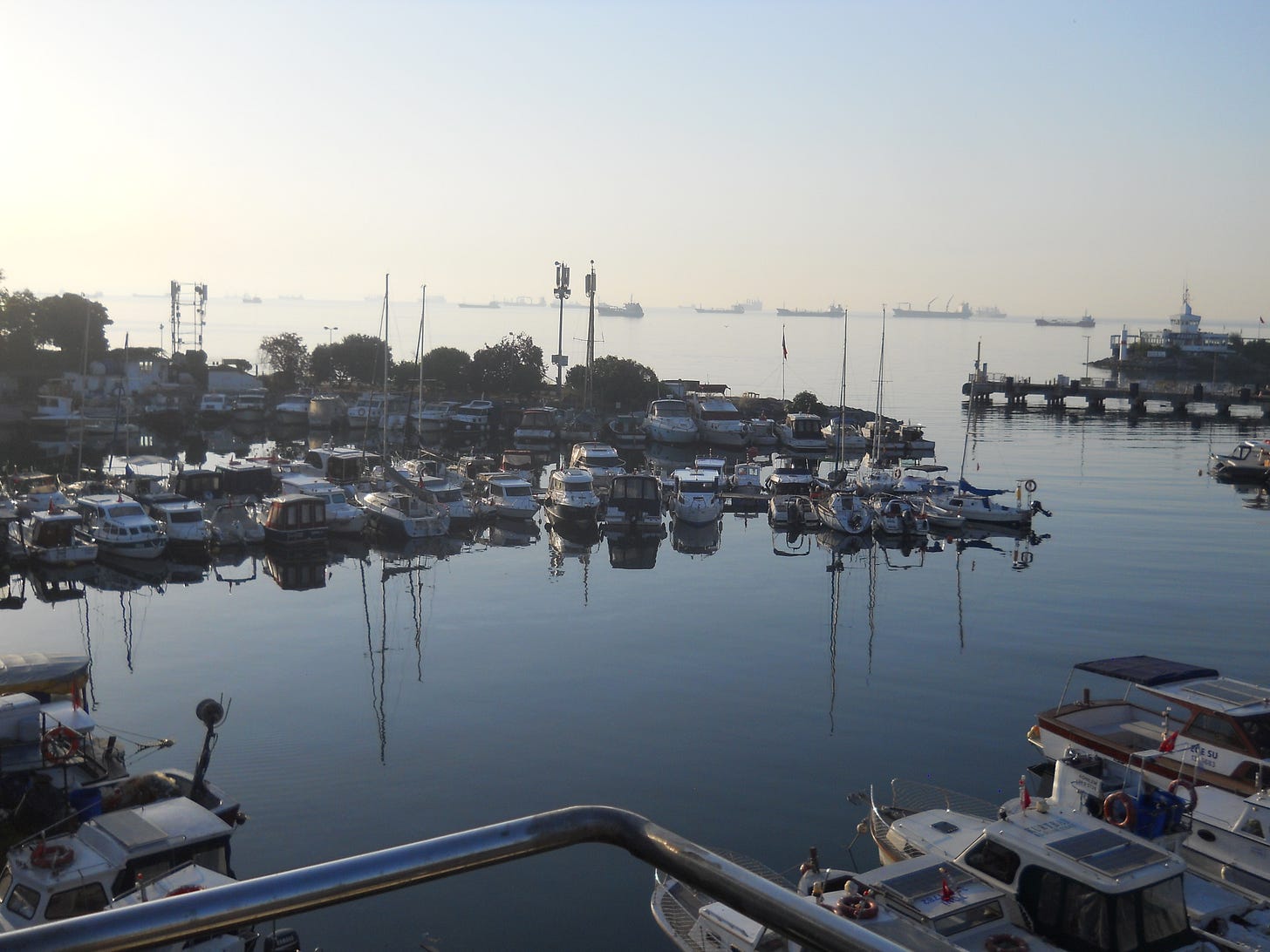
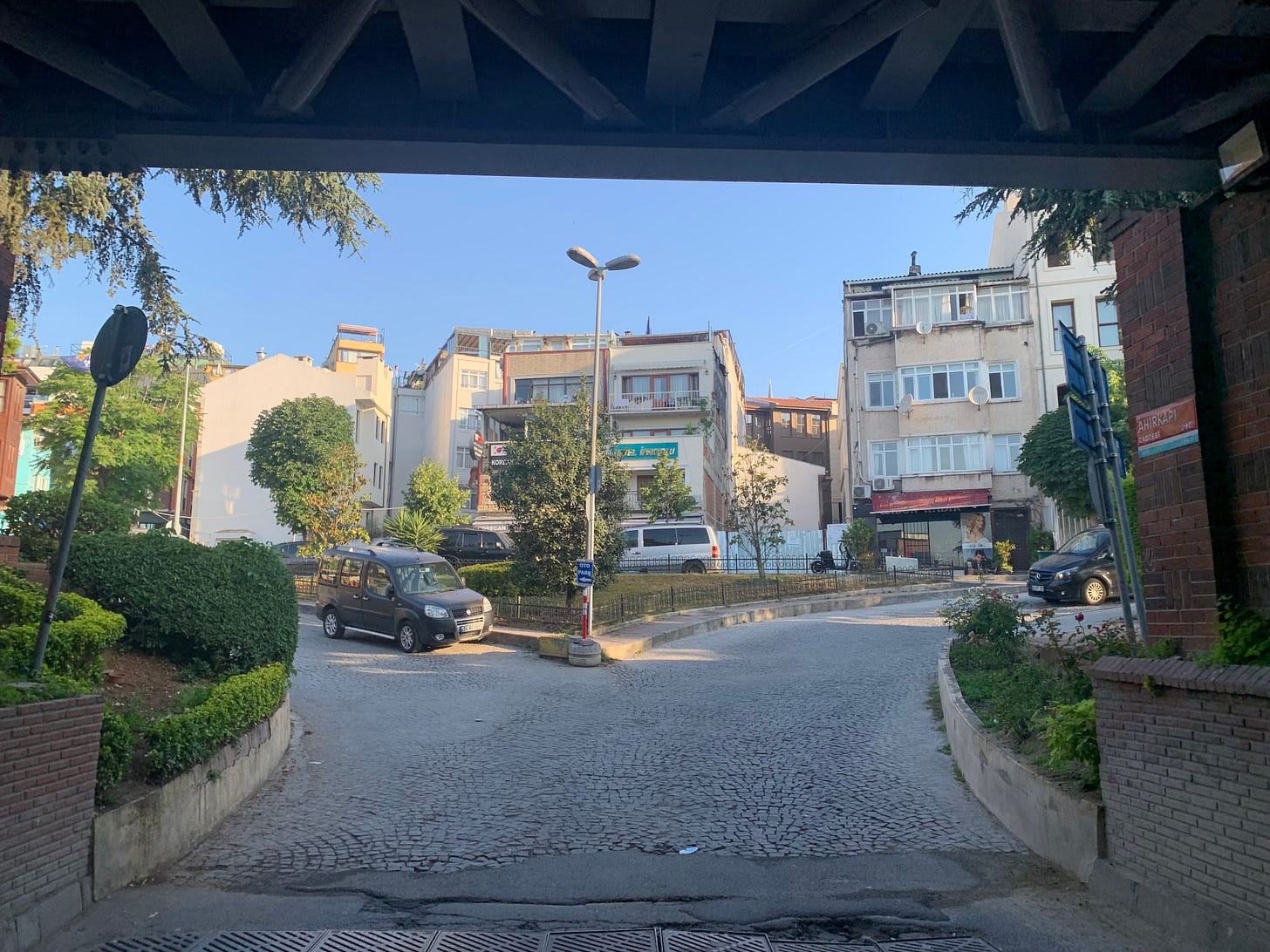

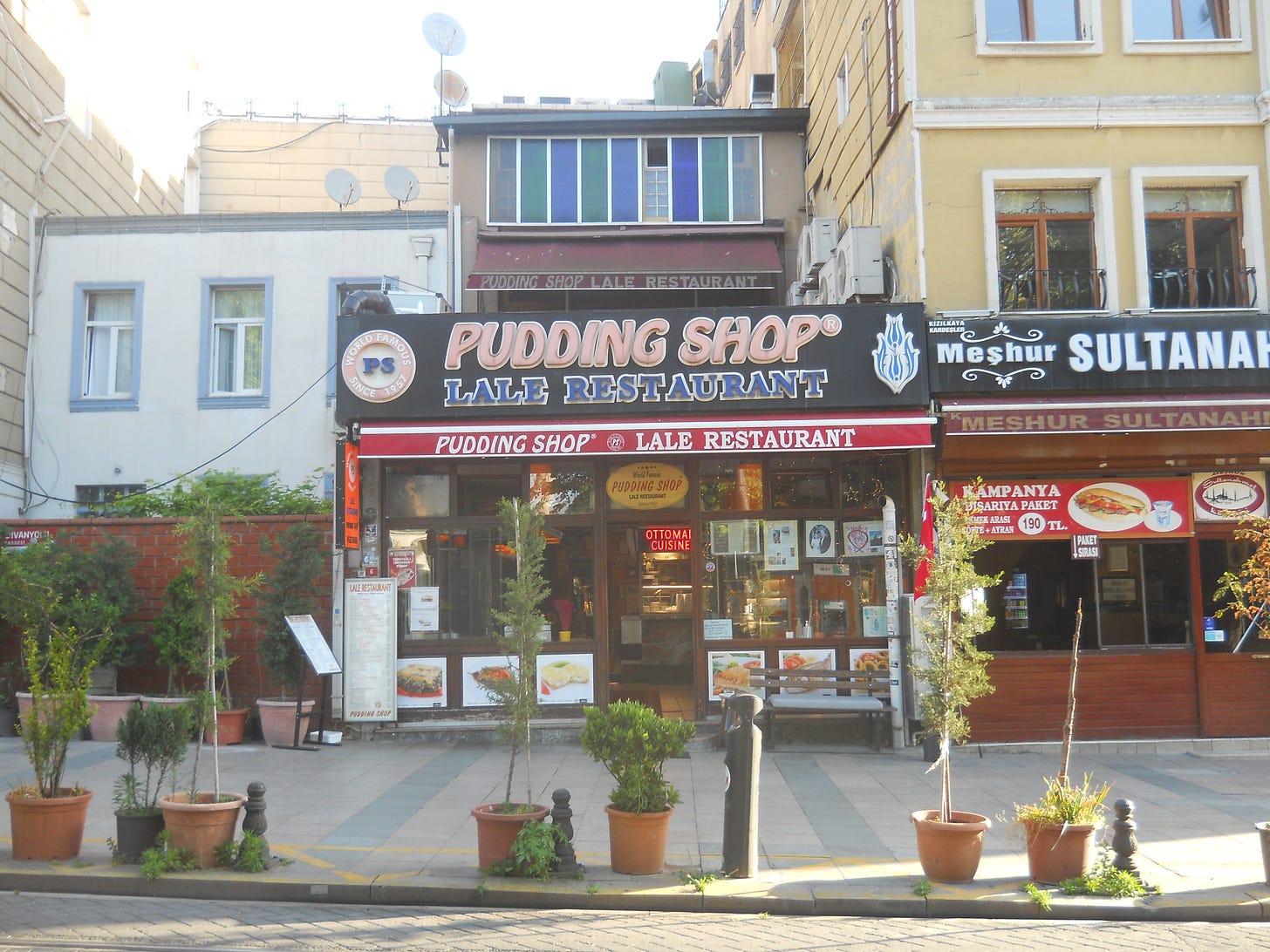


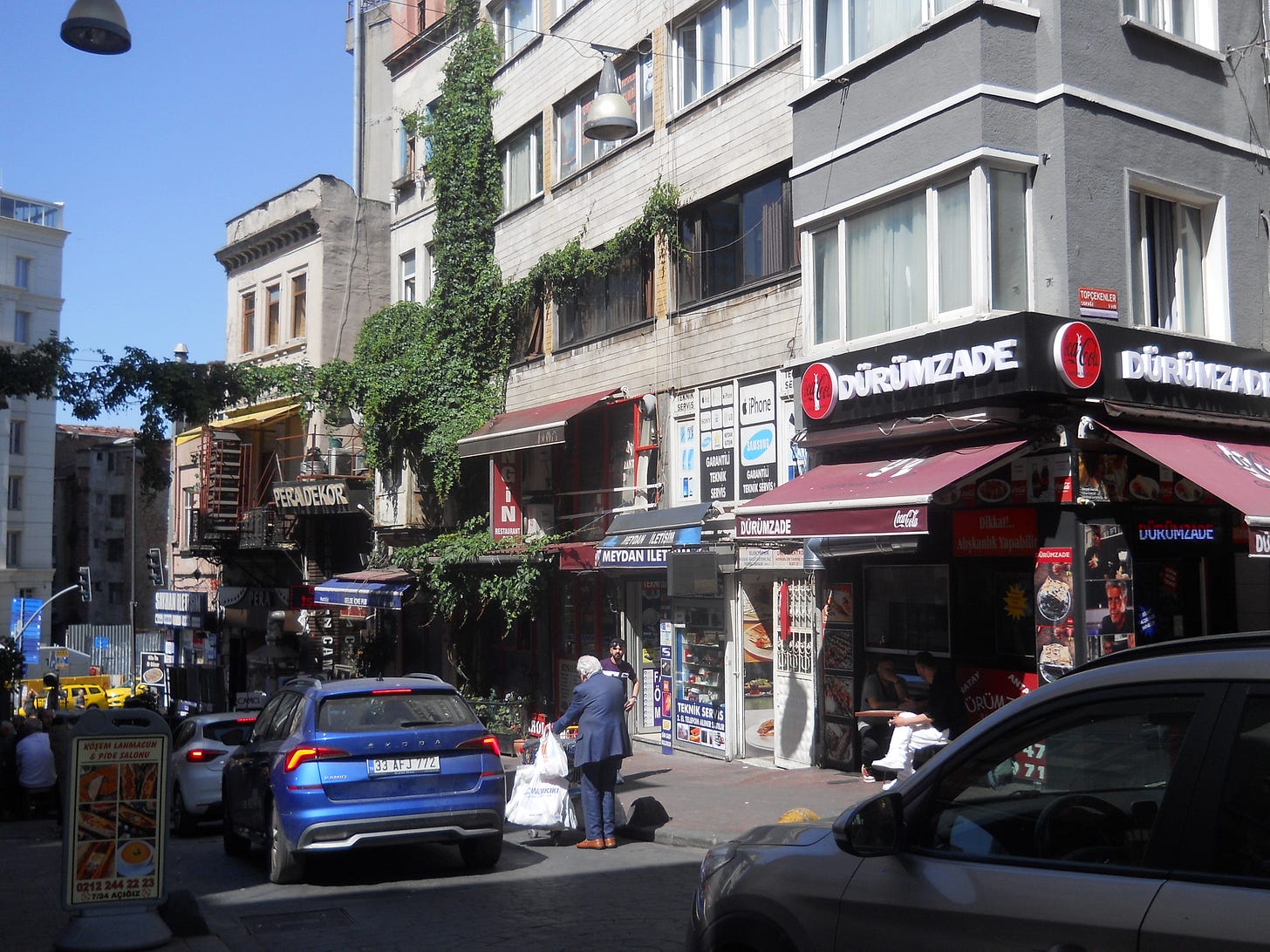

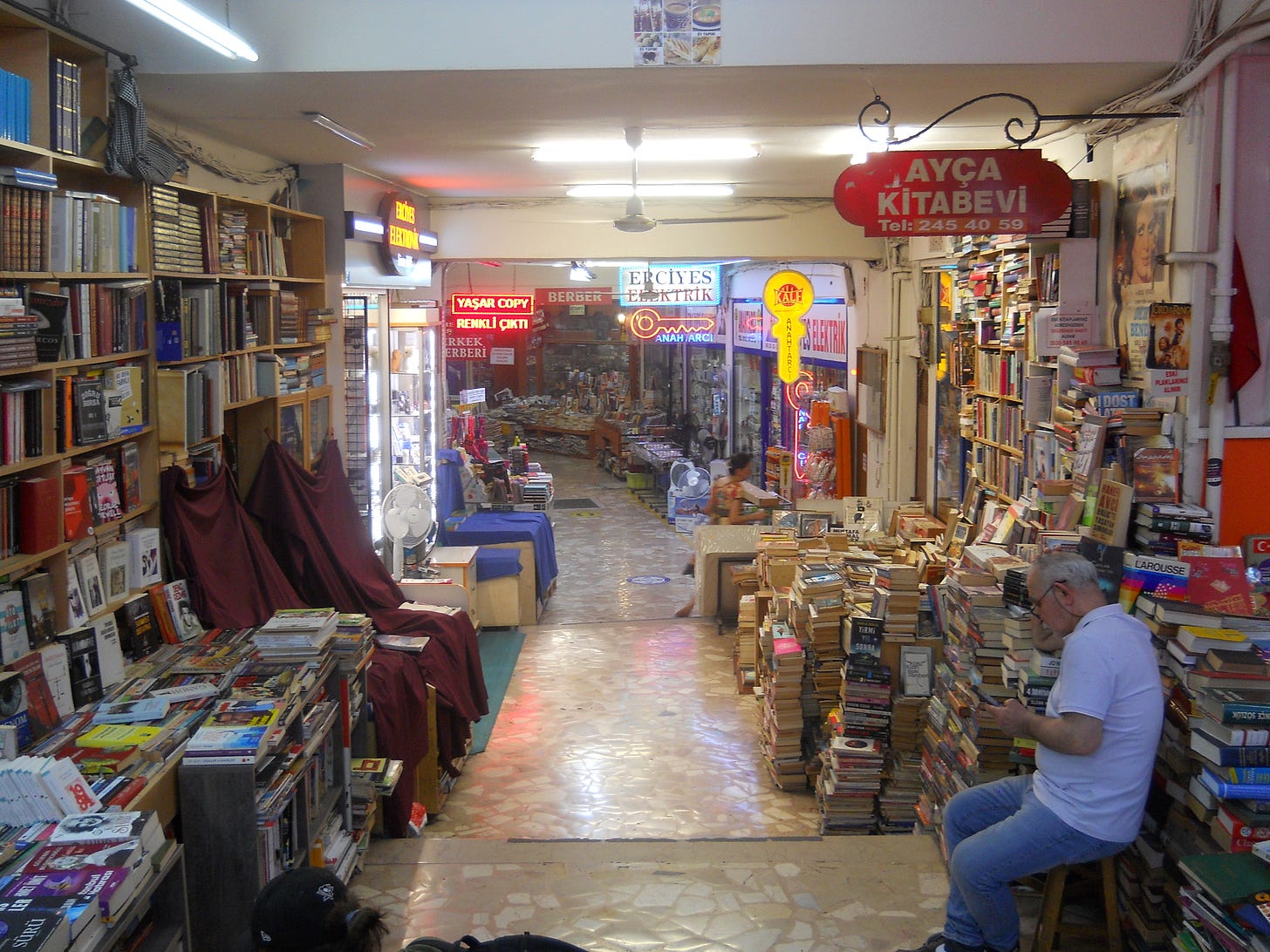
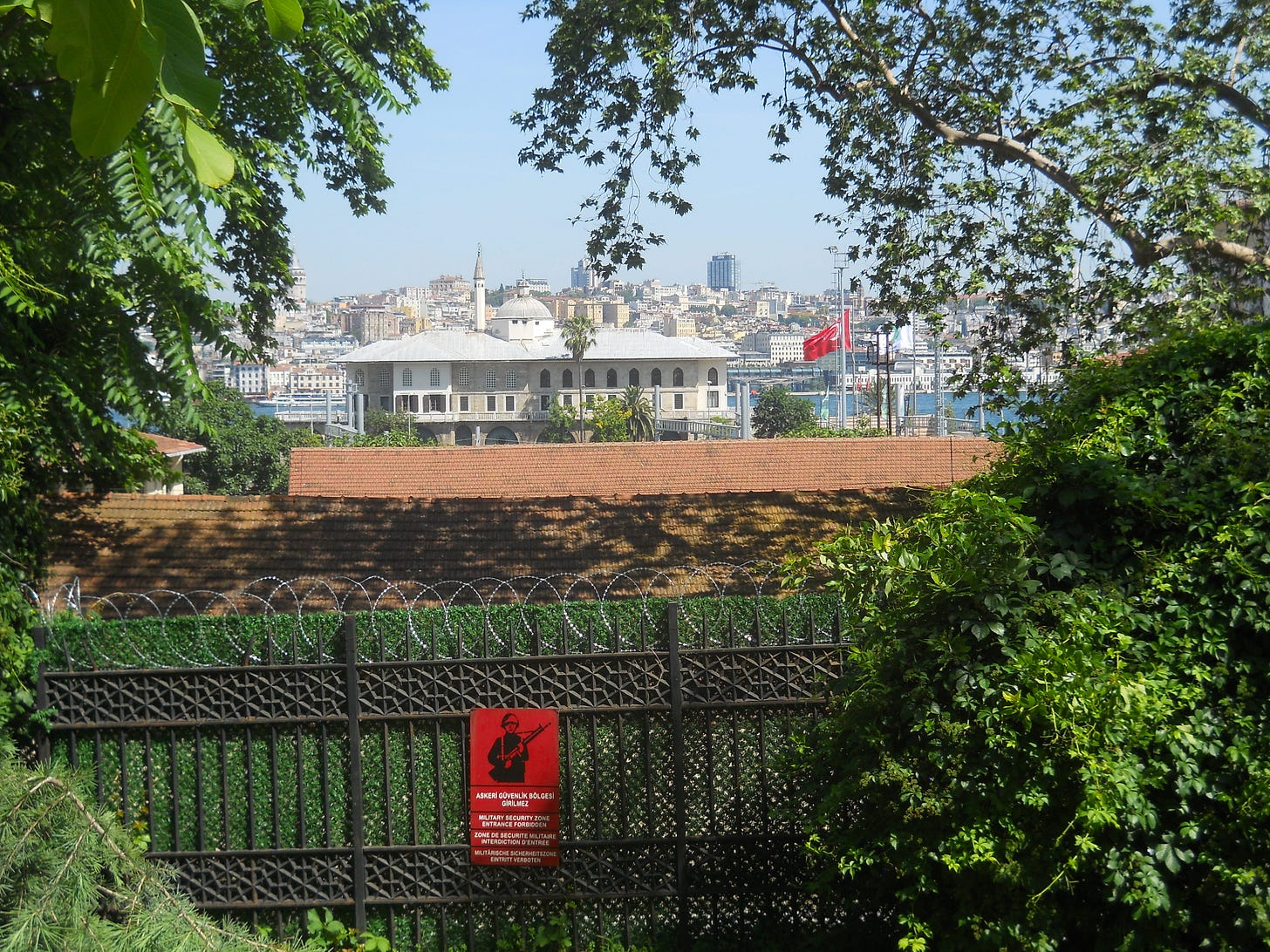
This is awesome! I hope you’re doing well🔥